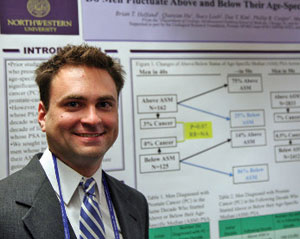Interpreting Changes in PSA Related to Age-Specific PSA

Previous studies have established median* PSA values for men in their 40s, 50s, 60s and 70s. These are 0.7, 0.9, 1.3, and 1.7 ng/mL, respectively.
Prior studies have also demonstrated that men who have PSA values above their age-specific median (ASM) are at significantly increased risk for prostate cancer diagnosis.
Decade to Decade
But it is not known whether a man whose PSA is above the ASM in one decade will remain above it in the next decade of life. The same is true for those who PSA is below the ASM; perhaps, theirs will rise to above the median.
This study, under the direction of Dr. William J. Catalona and supported by the Urological Research Foundation, sought to determine the frequency of men whose PSA remained above or below their ASM as they aged and, importantly, what effect such crossovers may have on prostate cancer risk.
Findings
The study found that a significantly greater proportion of men who were above the age-specific median for their decade remain above the age-specific median PSA value as they age compared to men who present with PSA values below the agespecific median PSA.
It also confirmed other studies that showed men with a PSA persistently above the age-specific median PSA were at significantly higher risk for subsequent prostate cancer diagnosis, and therefore they should be monitored more carefully for a rising PSA level.
*Median: is the midpoint of a distribution. In other words, half of the men are above and half are below it. In the case of age-specific PSA, the median PSA related to age is the PSA in which as many men have a value under that figure as above it in a particular decade.
**AUA Poster Presentation: Do Men Fluctuate Above and Below their Age-Specific Median PSA Values as They Age? Brian T. Helfand, MD, PhD; Qiaoyan Hu, Stacy Loeb, MD; Dae Y. Kim, MD, PhD; Phillip R. Cooper, Matthias D. Hofer, MD, PhD; Barry B. McGuire, MD; William J. Catalona, MD







